- Home
- Jack London
Love of Life Page 9
Love of Life Read online
Page 9
But in time Dennin grew more tractable. It seemed to her that he was growing weary of his unchanging recumbent position. He began to beg and plead to be released. He made wild promises. He would do them no harm. He would himself go down the coast and give himself up to the officers of the law. He would give them his share of the gold. He would go away into the heart of the wilderness, and never again appear in civilization. He would take his own life if she would only free him. His pleadings usually culminated in involuntary raving, until it seemed to her that he was passing into a fit; but always she shook her head and denied him the freedom for which he worked himself into a passion.
But the weeks went by, and he continued to grow more tractable. And through it all the weariness was asserting itself more and more. “I am so tired, so tired,” he would murmur, rolling his head back and forth on the pillow like a peevish child. At a little later period he began to make impassioned pleas for death, to beg her to kill him, to beg Hans to put him our of his misery so that he might at least rest comfortably.
The situation was fast becoming impossible. Edith’s nervousness was increasing, and she knew her break-down might come any time. She could not even get her proper rest, for she was haunted by the fear that Hans would yield to his mania and kill Dennin while she slept. Though January had already come, months would have to elapse before any trading schooner was even likely to put into the bay. Also, they had not expected to winter in the cabin, and the food was running low; nor could Hans add to the supply by hunting. They were chained to the cabin by the necessity of guarding their prisoner.
Something must be done, and she knew it. She forced herself to go back into a reconsideration of the problem. She could not shake off the legacy of her race, the law that was of her blood and that had been trained into her. She knew that whatever she did she must do according to the law, and in the long hours of watching, the shot-gun on her knees, the murderer restless beside her and the storms thundering without, she made original sociological researches and worked out for herself the evolution of the law. It came to her that the law was nothing more than the judgment and the will of any group of people. It mattered not how large was the group of people. There were little groups, she reasoned, like Switzerland, and there were big groups like the United States. Also, she reasoned, it did not matter how small was the group of people. There might be only ten thousand people in a country, yet their collective judgment and will would be the law of that country. Why, then, could not one thousand people constitute such a group? she asked herself. And if one thousand, why not one hundred? Why not fifty? Why not five? Why not-two?
She was frightened at her own conclusion, and she talked it over with Hans. At first he could not comprehend, and then, when he did, he added convincing evidence. He spoke of miners’ meetings, where all the men of a locality came together and made the law and executed the law. There might be only ten or fifteen men altogether, he said, but the will of the majority became the law for the whole ten or fifteen, and whoever violated that will was punished.
Edith saw her way clear at last. Dennin must hang. Hans agreed with her. Between them they constituted the majority of this particular group. It was the group-will that Dennin should be hanged. In the execution of this will Edith strove earnestly to observe the customary forms, but the group was so small that Hans and she had to serve as witnesses, as jury, and as judges-also as executioners. She formally charged Michael Dennin with the murder of Dutchy and Harkey, and the prisoner lay in his bunk and listened to the testimony, first of Hans, and then of Edith. He refused to plead guilty or not guilty, and remained silent when she asked him if he had anything to say in his own defence. She and Hans, without leaving their seats, brought in the jury’s verdict of guilty. Then, as judge, she imposed the sentence. Her voice shook, her eyelids twitched, her left arm jerked, but she carried it out.
“Michael Dennin, in three days’ time you are to be hanged by the neck until you are dead.”
Such was the sentence. The man breathed an unconscious sigh of relief, then laughed defiantly, and said, “Thin I’m thinkin’ the damn bunk won’t be achin’ me back anny more, an’ that’s a consolation.”
With the passing of the sentence a feeling of relief seemed to communicate itself to all of them. Especially was it noticeable in Dennin. All sullenness and defiance disappeared, and he talked sociably with his captors, and even with flashes of his old-time wit. Also, he found great satisfaction in Edith’s reading to him from the Bible. She read from the New Testament, and he took keen interest in the prodigal son and the thief on the cross.
On the day preceding that set for the execution, when Edith asked her usual question, “Why did you do it?” Dennin answered, “’Tis very simple. I was thinkin’-”
But she hushed him abruptly, asked him to wait, and hurried to Hans’s bedside. It was his watch off, and he came out of his sleep, rubbing his eyes and grumbling.
“Go,” she told him, “and bring up Negook and one other Indian. Michael’s going to confess. Make them come. Take the rifle along and bring them up at the point of it if you have to.”
Half an hour later Negook and his uncle, Hadikwan, were ushered into the death chamber. They came unwillingly, Hans with his rifle herding them along.
“Negook,” Edith said, “there is to be no trouble for you and your people. Only is it for you to sit and do nothing but listen and understand.”
Thus did Michael Dennin, under sentence of death, make public confession of his crime. As he talked, Edith wrote his story down, while the Indians listened, and Hans guarded the door for fear the witnesses might bolt.
He had not been home to the old country for fifteen years, Dennin explained, and it had always been his intention to return with plenty of money and make his old mother comfortable for the rest of her days.
“An’ how was I to be doin’ it on sixteen hundred?” he demanded. “What I was after wantin’ was all the goold, the whole eight thousan’. Thin I cud go back in style. What ud be aisier, thinks I to myself, than to kill all iv yez, report it at Skaguay for an Indian-killin’, an’ thin pull out for Ireland? An’ so I started in to kill all iv yez, but, as Harkey was fond of sayin’, I cut out too large a chunk an’ fell down on the swallowin’ iv it. An’ that’s me confession. I did me duty to the devil, an’ now, God willin’, I’ll do me duty to God.”
“Negook and Hadikwan, you have heard the white man’s words,” Edith said to the Indians. “His words are here on this paper, and it is for you to make a sign, thus, on the paper, so that white men to come after will know that you have heard.”
The two Siwashes put crosses opposite their signatures, received a summons to appear on the morrow with all their tribe for a further witnessing of things, and were allowed to go.
Dennin’s hands were released long enough for him to sign the document. Then a silence fell in the room. Hans was restless, and Edith felt uncomfortable. Dennin lay on his back, staring straight up at the moss-chinked roof.
“An’ now I’ll do me duty to God,” he murmured. He turned his head toward Edith. “Read to me,” he said, “from the book;” then added, with a glint of playfulness, “Mayhap ’twill help me to forget the bunk.”
The day of the execution broke clear and cold. The thermometer was down to twenty-five below zero, and a chill wind was blowing which drove the frost through clothes and flesh to the bones. For the first time in many weeks Dennin stood upon his feet. His muscles had remained inactive so long, and he was so out of practice in maintaining an erect position, that he could scarcely stand.
He reeled back and forth, staggered, and clutched hold of Edith with his bound hands for support.
“Sure, an’ it’s dizzy I am,” he laughed weakly.
A moment later he said, “An’ it’s glad I am that it’s over with. That damn bunk would iv been the death iv me, I know.”
When Edith put his fur cap on his head and proceeded to pull the flaps down over his ears, he laughed and said:
“What are you doin’ that for?”
“It’s freezing cold outside,” she answered.
“An’ in tin minutes’ time what’ll matter a frozen ear or so to poor Michael Dennin?” he asked.
She had nerved herself for the last culminating ordeal, and his remark was like a blow to her self-possession. So far, everything had seemed phantom-like, as in a dream, but the brutal truth of what he had said shocked her eyes wide open to the reality of what was taking place. Nor was her distress unnoticed by the Irishman.
“I’m sorry to be troublin’ you with me foolish spache,” he said regretfully. “I mint nothin’ by it. ’Tis a great day for Michael Dennin, an’ he’s as gay as a lark.”
He broke out in a merry whistle, which quickly became lugubrious and ceased.
“I’m wishin’ there was a priest,” he said wistfully; then added swiftly, “But Michael Dennin’s too old a campaigner to miss the luxuries when he hits the trail.”
He was so very weak and unused to walking that when the door opened and he passed outside, the wind nearly carried him off his feet. Edith and Hans walked on either side of him and supported him, the while he cracked jokes and tried to keep them cheerful, breaking off, once, long enough to arrange the forwarding of his share of the gold to his mother in Ireland.
They climbed a slight hill and came out into an open space among the trees. Here, circled solemnly about a barrel that stood on end in the snow, were Negook and Hadikwan, and all the Siwashes down to the babies and the dogs, come to see the way of the white man’s law. Near by was an open grave which Hans had burned into the frozen earth.
Dennin cast a practical eye over the preparations, noting the grave, the barrel, the thickness of the rope, and the diameter of the limb over which the rope was passed.
“Sure, an’ I couldn’t iv done better meself, Hans, if it’d been for you.”
He laughed loudly at his own sally, but Hans’s face was frozen into a sullen ghastliness that nothing less than the trump of doom could have broken. Also, Hans was feeling very sick. He had not realized the enormousness of the task of putting a fellow-man out of the world. Edith, on the other hand, had realized; but the realization did not make the task any easier. She was filled with doubt as to whether she could hold herself together long enough to finish it. She felt incessant impulses to scream, to shriek, to collapse into the snow, to put her hands over her eyes and turn and run blindly away, into the forest, anywhere, away. It was only by a supreme effort of soul that she was able to keep upright and go on and do what she had to do. And in the midst of it all she was grateful to Dennin for the way he helped her.
“Lind me a hand,” he said to Hans, with whose assistance he managed to mount the barrel.
He bent over so that Edith could adjust the rope about his neck. Then he stood upright while Hans drew the rope taut across the overhead branch.
“Michael Dennin, have you anything to say?” Edith asked in a clear voice that shook in spite of her.
Dennin shuffled his feet on the barrel, looked down bashfully like a man making his maiden speech, and cleared his throat.
“I’m glad it’s over with,” he said. “You’ve treated me like a Christian, an’ I’m thankin’ you hearty for your kindness.”
“Then may God receive you, a repentant sinner,” she said.
“Ay,” he answered, his deep voice as a response to her thin one, “may God receive me, a repentant sinner.”
“Good-by, Michael,” she cried, and her voice sounded desperate.
She threw her weight against the barrel, but it did not overturn.
“Hans! Quick! Help me!” she cried faintly.
She could feel her last strength going, and the barrel resisted her. Hans hurried to her, and the barrel went out from under Michael Dennin.
She turned her back, thrusting her fingers into her ears. Then she began to laugh, harshly, sharply, metallically; and Hans was shocked as he had not been shocked through the whole tragedy. Edith Nelson’s break-down had come. Even in her hysteria she knew it, and she was glad that she had been able to hold up under the strain until everything had been accomplished. She reeled toward Hans.
“Take me to the cabin, Hans,” she managed to articulate.
“And let me rest,” she added. “Just let me rest, and rest, and rest.”
With Hans’s arm around her, supporting her weight and directing her helpless steps, she went off across the snow. But the Indians remained solemnly to watch the working of the white man’s law that compelled a man to dance upon the air.
BROWN WOLF
She had delayed, because of the dew-wet grass, in order to put on her overshoes, and when she emerged from the house found her waiting husband absorbed in the wonder of a bursting almond-bud. She sent a questing glance across the tall grass and in and out among the orchard trees.
“Where’s Wolf?” she asked.
“He was here a moment ago.” Walt Irvine drew himself away with a jerk from the metaphysics and poetry of the organic miracle of blossom, and surveyed the landscape. “He was running a rabbit the last I saw of him.”
“Wolf! Wolf! Here Wolf!” she called, as they left the clearing and took the trail that led down through the waxen-belled manzanita jungle to the county road.
Irvine thrust between his lips the little finger of each hand and lent to her efforts a shrill whistling.
She covered her ears hastily and made a wry grimace.
“My! for a poet, delicately attuned and all the rest of it, you can make unlovely noises. My ear-drums are pierced. You outwhistle-”
“Orpheus.”
“I was about to say a street-arab,” she concluded severely.
“Poesy does not prevent one from being practical-at least it doesn’t prevent me. Mine is no futility of genius that can’t sell gems to the magazines.”
He assumed a mock extravagance, and went on:
“I am no attic singer, no ballroom warbler. And why? Because I am practical. Mine is no squalor of song that cannot transmute itself, with proper exchange value, into a flower-crowned cottage, a sweet mountain-meadow, a grove of redwoods, an orchard of thirty-seven trees, one long row of blackberries and two short rows of strawberries, to say nothing of a quarter of a mile of gurgling brook. I am a beauty-merchant, a trader in song, and I pursue utility, dear Madge. I sing a song, and thanks to the magazine editors I transmute my song into a waft of the west wind sighing through our redwoods, into a murmur of waters over mossy stones that sings back to me another song than the one I sang and yet the same song wonderfully-er-transmuted.”
“O that all your song-transmutations were as successful!” she laughed.
“Name one that wasn’t.”
“Those two beautiful sonnets that you transmuted into the cow that was accounted the worst milker in the township.”
“She was beautiful-” he began,
“But she didn’t give milk,” Madge interrupted.
“But she was beautiful, now, wasn’t she?” he insisted.
“And here’s where beauty and utility fall out,” was her reply. “And there’s the Wolf!”
From the thicket-covered hillside came a crashing of underbrush, and then, forty feet above them, on the edge of the sheer wall of rock, appeared a wolf’s head and shoulders. His braced fore paws dislodged a pebble, and with sharp-pricked ears and peering eyes he watched the fall of the pebble till it struck at their feet. Then he transferred his gaze and with open mouth laughed down at them.
“You Wolf, you!” and “You blessed Wolf!” the man and woman called out to him.
The ears flattened back and down at the sound, and the head seemed to snuggle under the caress of an invisible hand.
They watched him scramble backward into the thicket, then proceeded on their way. Several minutes later, rounding a turn in the trail where the descent was less precipitous, he joined them in the midst of a miniature avalanche of pebbles and loose soil. He was not demonstrative. A pat and a rub
around the ears from the man, and a more prolonged caressing from the woman, and he was away down the trail in front of them, gliding effortlessly over the ground in true wolf fashion.
In build and coat and brush he was a huge timber-wolf; but the lie was given to his wolfhood by his color and marking. There the dog unmistakably advertised itself. No wolf was ever colored like him. He was brown, deep brown, red-brown, an orgy of browns. Back and shoulders were a warm brown that paled on the sides and underneath to a yellow that was dingy because of the brown that lingered in it. The white of the throat and paws and the spots over the eyes was dirty because of the persistent and ineradicable brown, while the eyes themselves were twin topazes, golden and brown.
The man and woman loved the dog very much; perhaps this was because it had been such a task to win his love. It had been no easy matter when he first drifted in mysteriously out of nowhere to their little mountain cottage. Footsore and famished, he had killed a rabbit under their very noses and under their very windows, and then crawled away and slept by the spring at the foot of the blackberry bushes. When Walt Irvine went down to inspect the intruder, he was snarled at for his pains, and Madge likewise was snarled at when she went down to present, as a peace-offering, a large pan of bread and milk.
A most unsociable dog he proved to be, resenting all their advances, refusing to let them lay hands on him, menacing them with bared fangs and bristling hair. Nevertheless he remained, sleeping and resting by the spring, and eating the food they gave him after they set it down at a safe distance and retreated. His wretched physical condition explained why he lingered; and when he had recuperated, after several days’ sojourn, he disappeared.
And this would have been the end of him, so far as Irvine and his wife were concerned, had not Irvine at that particular time been called away into the northern part of the state. Riding along on the train, near to the line between California and Oregon, he chanced to look out of the window and saw his unsociable guest sliding along the wagon road, brown and wolfish, tired yet tireless, dust-covered and soiled with two hundred miles of travel.

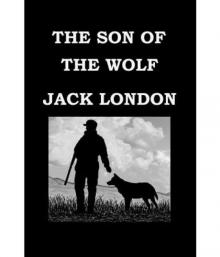 The Son of the Wolf
The Son of the Wolf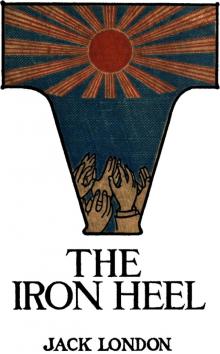 The Iron Heel
The Iron Heel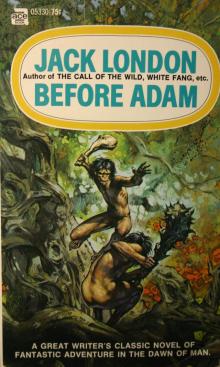 Before Adam
Before Adam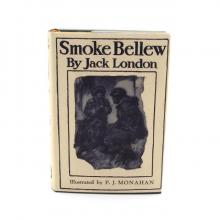 Smoke Bellew
Smoke Bellew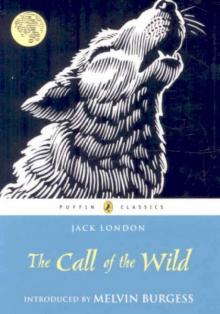 The Call of the Wild
The Call of the Wild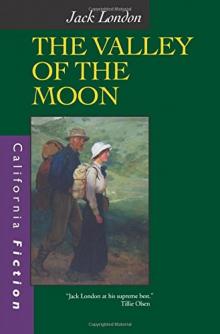 The Valley of the Moon Jack London
The Valley of the Moon Jack London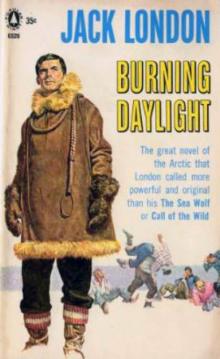 Burning Daylight
Burning Daylight The Sea Wolf
The Sea Wolf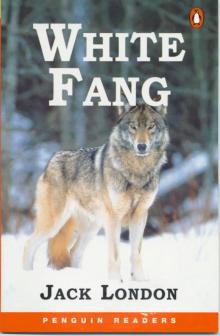 White Fang
White Fang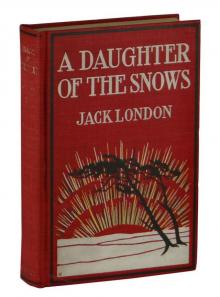 A Daughter of the Snows
A Daughter of the Snows The Night-Born
The Night-Born A Son Of The Sun
A Son Of The Sun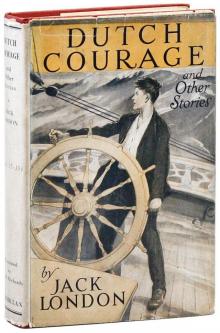 Dutch Courage and Other Stories
Dutch Courage and Other Stories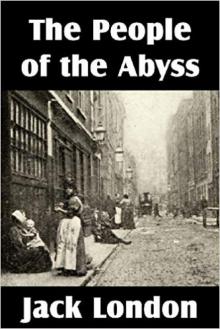 The People of the Abyss
The People of the Abyss Michael, Brother of Jerry
Michael, Brother of Jerry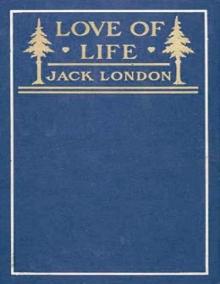 Love of Life, and Other Stories
Love of Life, and Other Stories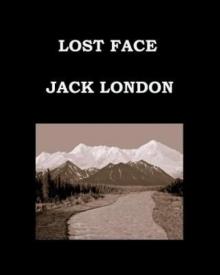 Lost Face
Lost Face The Road
The Road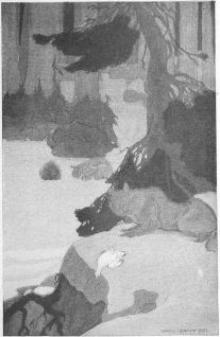 Love of Life
Love of Life The Turtles of Tasman
The Turtles of Tasman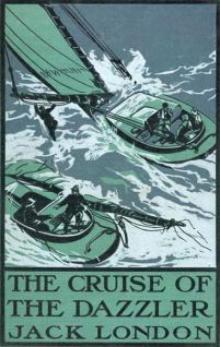 The Cruise of The Dazzler
The Cruise of The Dazzler The Heathen
The Heathen The Scab
The Scab The Faith of Men
The Faith of Men Adventure
Adventure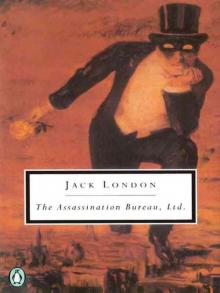 The Assassination Bureau, Ltd.
The Assassination Bureau, Ltd.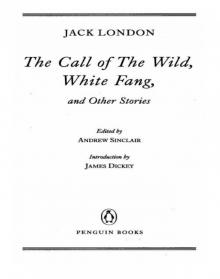 The Call of the Wild, White Fang, and Other Stories
The Call of the Wild, White Fang, and Other Stories The Call of the Wild and Selected Stories
The Call of the Wild and Selected Stories Jerry of the Islands
Jerry of the Islands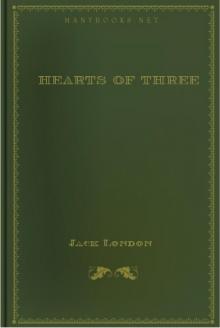 Hearts of Three
Hearts of Three The House of Pride
The House of Pride Moon-Face and Other Stories
Moon-Face and Other Stories Children of the Frost
Children of the Frost South Sea Tales
South Sea Tales The Strength of the Strong
The Strength of the Strong The Jacket (The Star-Rover)
The Jacket (The Star-Rover) The Little Lady of the Big House
The Little Lady of the Big House John Barleycorn
John Barleycorn ADaugter of Snows
ADaugter of Snows The Mutiny of the Elsinore
The Mutiny of the Elsinore Northland Stories
Northland Stories Tales of the Fish Patrol
Tales of the Fish Patrol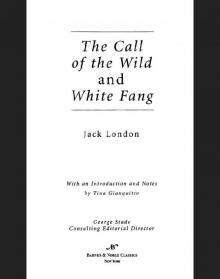 Call of the Wild and White Fang (Barnes & Noble Classics Series)
Call of the Wild and White Fang (Barnes & Noble Classics Series) The Valley of the Moon
The Valley of the Moon The Cruise of the Snark
The Cruise of the Snark The Game
The Game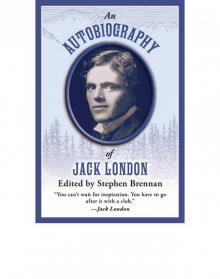 An Autobiography of Jack London
An Autobiography of Jack London